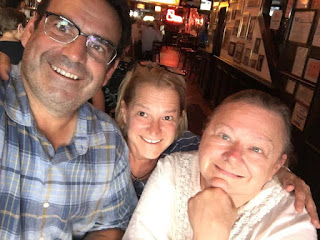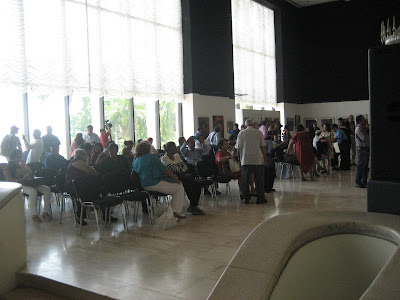A Case of The Blahs
Soon, classes at Keiser University Latin American Campus will resume, and my twice-weekly tutoring schedule with them. The past two months since my vacation have seemed hermitic (Is there such a word? Hermitically sealed?). I have spent most of my time alone, in the company of my little Greek chorus, the three doggies who follow me inside and out, constantly craving attention and treats. Of course, Maria José and her brother Roger have come to do their work in the house and garden, and I make my usual rounds to pay bills and buy groceries, but I have felt zero inclination to see anyone or do anything in particular. Likewise, my energy level has been quite low. On humid mornings, I feel incapable of walking even a quarter-mile. Napping is my favorite activity, and I wonder if I shall ever feel like doing anything ever again.
I'm chalking it up to rainy season malaise. When the humidity drops, I'll perk up.
Walking in Nicaragua
When I was a little girl, my eyes were not straight. I have always used only one eye, as the other sees a different angle, and using both would result in a double image. Surgeries and eye patches helped straighten out my appearance to some degree, but because my classmates at Our Mother of Sorrows school in Johnstown were so cruel (especially the son of my eye doctor!), I always walked home looking down at my feet, so as not to invite comment.
I got over it; further surgery in adulthood helped. Lately, though, I have reverted to that earlier form. Here in Nicaragua, I dare not step unmindfully, or I risk ending up prone and bruised. Most sidewalks, when there
are sidewalks, are narrower than we have in the States, and have lozenge-shaped access holes for water pipes below. Some of the holes still have cement lids, but many do not, and some have crumbled to twice their original size. It's a perilous path indeed.
Not only that, but everywhere, there are lingering stubs of metal sign posts that have been mostly removed, save for two or three inches of steel sticking up in the middle of the road or sidewalk. Twice, after descending from a bus in Jinotepe, I tripped and tore open my knee in the exact same place because of a metal obstacle embedded in the concrete. When I finally saw what had tripped me up, I simply could not believe it had been left in place. But I have since seen many such examples.
Owners of stores and houses often pave the sidewalk in front of their buildings with distinctive tiles and mosaics, some very slippery when wet. Woe to anyone who goes striding down the walkway unaware that the
hausfrau has just emptied a bucket onto her front stoop!
The colors and flowers and displays of fruits and vegetables do tempt the eye, but far better to stop and look around, and then continue on, eyes downward.
Salvation in Reading
Anent my above observation that I have become a hermit, I must add that the two to four books I read every two weeks afford me a rich and varied life of the mind. For the past year, I have been working my way through the English and American Literature shelves of Keiser University's library. My tastes run to 18th and 19th-c. English lit, but I also enjoy Homer, Dante, Euripedes, and Virgil. Also more contemporary efforts, from Elena Ferrante to Abraham Verghese (just finished "Cutting for Stone" - wonderful!).
When my mother was in her last years, I discovered the novels of Anthony Trollope, who chronicled Victorian England in his many tales of middle-class and better-off people of trades, professions and the aristocracy. His comic yarns of pompous clerics and scalawag barristers, and romances with long-suffering devoted daughters and feckless lotharios are charming, absorbing, amusing, and often heartbreaking. My mother relished Trollope's novels, devouring them as fast as I could order them. She was in the grip of dementia, with impaired short-term memory, but as long as she was reading, she was free of the limits of age and ill health. She may not have recalled the characters and plots for long, but while she was in the moment, reading and enjoying Trollope's lively tales, she was 100% herself, wholly engaged.


























































